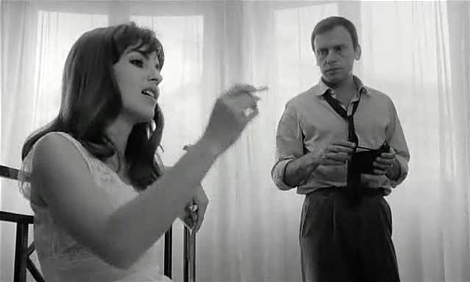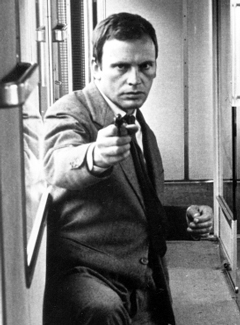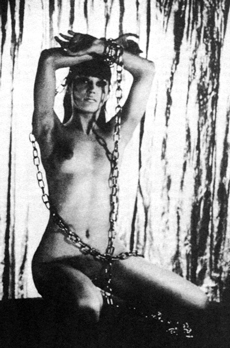|
|
Reviewed by Glenn Erickson
Who says art films never make a buck? French "New Novel" author Alain Robbe-Grillet partnered with Alain Resnais on the screenplay for definitive opaque art picture Last Year at Marienbad and apparently caught the filmmaking bug in a big way. His 1963 L'Immortelle earned some prestigious festival awards, and for a follow up he concocted Trans-Europ-Express, a self-reflexive crime tale. Anyone expecting a normal show will be surprised to find a thriller about the construction of a thriller. We're given what to some degree looks like an assembly kit for a movie, with both the filmmakers and some filmmakers-within-the-film rewriting the details as it goes along. How did the show become a substantial European box-office hit? Well, star Jean-Louis Trintignant had jumped from featured lead actor to international star with the previous year's A Man and A Woman. That, and writer-director Robbe-Grillet carried over some of the kinky subject matter of his novels -- the movie has nudity, bondage, and a 'hero' whose pastime is contemplating rape fantasies.

The story plays out on two levels of reality. A producer and his director (Robbe-Grillet himself) ride the new Trans-Europ-Express across the French border, with the idea of concocting a cocaine-trafficking screenplay en route. They see actor Jean-Louis Trintignant in their compartment, briefly, and 'write him into the story.' Trintignant is now Elias, a first time drug mule. Following instructions, Elias makes contact with a number of operatives including the wary gang leader Franck (Charles Millot of The Train). He allows himself to be picked up by Eva, a prostitute (Marie-France Pisier), and pays her to pretend to be raped. After stoically enduring a number of frustrating incidents, Elias is told the next day that all the 'strangers' he has been dealing with are part of the gang testing him, and that he passed the test. But before returning to Paris to do the same thing for real, he vents his anger at another thug on his tail, finding out only later that the man is not a gang member but Lorentz (Christian Barbier), a real narcotics cop. Elias goes forward with the smuggling gig until he spies Eva stealing an important key from his coat --- and giving it to Lorentz on the street.
Monsieur Robbe-Grillet has a fun time with his 'make it up as it goes along' rib at the relationship of writing to reality. As the filmmakers hash out the story in the train compartment, their secretary continually interrupts to remind her employers that they're ignoring facts, missing important details, and spinning off on tangents that contradict what's gone before. When the secretary reminds them that Elias has a paper packet of clothing that can't just disappear without any reason the director wave such concerns off as irrelevant. The movie then cuts to two or three shots of Elias just throwing the package away. How crucial are continuity details to a thriller, anyway? The secretary says that cocaine smuggling with Brussels makes little sense, and that they should switch to diamonds. But the diamond racket sounds too complicated, so her advice is ignored.

"Jean-Louis Trintignant", or Elias, is playing the same self-aware games. Buying a suitcase, he jokingly asks for the kind that has a secret compartment to carry drugs. When asked about his occupation, he replies, "Amateur assassin." He has fantasy daydreams of failure, but also of adolescent scenarios, like firing his tiny pistol with the flourish of a pulp hero. He sees a poster of James Bond, and tries out a 007 pose. The whole thriller concept becomes absurd when it becomes apparent that Elias can't trust anybody, and nothing that happens appears to make any sense -- it's all a test. He's stuck with espionage movie clichés, such as repeated scenes in which contacts identify each other with code phrases. It's as if Elias / Trintignant is aware that some bad writers are making life miserable for him. "Fate" is in the whim of the screenwriter, and these particular screenwriters seem to prefer "cruel Fate" over a happy ending.
Although reportedly produced for little money, the movie has the great '60s look of B&W shot on Tri-X film stock. The style is playful, with the B&W images of city streets and a wharf district enlivened through sharp editing and a fairly brisk pace. The actors seem to be mostly in the right groove, with Trintignant shifting imperceptibly between his dual/concurrent roles of sober drug mule and movie star. As he's often recognized in public, the actor looks the other way when women try to flirt with him. The maid in the hotel hangs around in such an 'available' manner that Elias must bodily throw her out of his room, much the same as Eddie Constantine did in Alphaville.
Some of the drug operatives look a little corny and colorless, and Robbe-Grillet doesn't work very hard at action scenes -- a confrontation in a scrap yard is a collection of shots in search of a director. On the good side is a detailed, realistic soundtrack that makes excellent use of location ambiances.

Jean-Luc Godard's said that to make a movie, all one needs is a girl and a gun. To that formula Alain Robbe-Grillet adds smut magazines, a good length of rope and a nude cabaret performer in chains. Elias is interested in rough sex, and demands that Eva protest and fight back. When he pays her later, he tells her that she probably fought back a little too much. Marie-France Pisier is a charming, game presence. The intelligent look on her face prevents a sordid vibe from setting in. Robbe-Grillet avoids charges of exploitation by communicating an enthusiastic interest in his subject matter -- this stuff is tame by today's standards -- but we can see that it turns him on. The image of the stripper doing her 'slave act' on a rotating platform appeared in most of the publicity, and surely sold the public on the movie.
The new Blu-ray of Trans-Europ-Express is the first of as many as six Alain Robbe-Grillet features coming from Redemptionand Kino Lorber Classics. The transfer is impeccable, picture and sound, with attractive B&W images that invite close examination of everything we see -- advertising signs, posters for movies ("Cat Ballou"), menus in restaurants. One of the bondage magazines Elias picks up has a film review for Thunderball, but the text is just below the readability horizon.

The disc includes a Redemption promo for the Alain Robbe-Grillet releases, that gathers together all the provocative naughty bits that don't feature out 'n out nudity. Actual trailers for a couple of the films are included as well. Much appreciated by this reviewer is a 36-minute interview with Alain Robbe-Grillet in which he happily talks all about Trans-Europ-Express. He's quite pleased with his playfully structured thriller. He also thinks that his is the first movie to be shot on a real moving train. While he's talking about the innovative aspect of his show, we're thinking about two or three other movies (there must be a few more) in which a story is being written as we watch, with changes happening as we watch. The two I can think of are comedies: Richard Quine's Paris When It Sizzles (apparently a remake of something by Julien Duvivier) and W.C. Fields' Never Give a Sucker an Even Break. Mr. Robbe-Grillet says that he doesn't approve of directors that revise their movies. He then suggests a great twist ending for Trans-Europ-Express that he didn't think of. It's refreshing to hear from a '60s era art filmmaker who has such a pleasant perspective on his work.
I'll next give a spin to a Robbe-Grillet title called Successive Slidings of Pleasure. I may have to wrap the review in brown paper, we'll see.
On a scale of Excellent, Good, Fair, and Poor,
Trans-Europ-Express Blu-ray rates:
Movie: Good +
Video: Excellent
Sound: Excellent
Supplements: Trailers (not for Trans-Europ-Express), promo, Interview with the director.
Deaf and Hearing Impaired Friendly?
YES; Subtitles: English
Packaging: Keep case
Reviewed: January 30, 2014

Text © Copyright Glenn Erickson 2014
See more exclusive reviews on the Savant Main Page.
Reviews on the Savant main site have additional credits information and are often updated and annotated with reader input and graphics.
T'was Ever Thus.
Return to Top of Page
|

